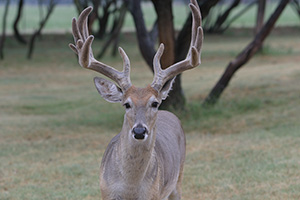The Texas Parks and Wildlife Commission has approved new chronic wasting disease (CWD) zones and approved new regulations restricting carcass movement from CWD zones within Texas.
On August 25, the commission also adopted rules restricting live deer movement authorized under permits to or from properties within those areas, and it approved regulations banning importation of certain deer carcass parts from states where the disease has been detected.
“The reason behind all of this is that we don’t want to inadvertently transfer those prions that are present in CWD-infected deer into new areas,” Steve Lightfoot, Texas Parks and Wildlife Department (TPWD) spokesperson, told the Texas Farm Bureau Radio Network.
Hunters will be allowed to transport boned or packaged venison, cut quarters with the brain stem and spinal tissue removed, caped hides with skull not attached, the skull plate with antlers attached and cleaned of all soft tissue or finished taxidermy products.
Hunters wishing to preserve a head for mounting can obtain a waiver to transport the skinned or unskinned head of a susceptible species to a taxidermist, provided all brain material, soft tissue, spinal column and any unused portions of the head are disposed of in a landfill in Texas permitted by the Texas Commission on Environmental Quality. These waivers can be obtained at CWD check stations where TPWD staff will collect CWD samples.
The commission revised the CWD zone structure by reducing the number of tiers from three to two—Containment Zones (CZ) and Surveillance Zones (SZ)—to more appropriately characterize areas where the disease has been detected.
The new rules shrink the current CWD zones in Culberson, El Paso, Hudspeth and Reeves counties based on the department’s CWD surveillance efforts over the past four hunting seasons, establish a new CZ and SZ in the western Panhandle around Hartley County and create a SZ in portions of Bandera, Medina and Uvalde counties.
Since the disease has only been associated with permitted deer breeding facilities and an enclosed release site within the Medina area SZ, the new rules do not require hunters in this particular zone to submit harvested deer for sampling. But a grassroots effort to generate voluntary samples from hunter harvests will be necessary to establish sufficient confidence that the disease will be detected if present at a low prevalence.
TPWD encourages all hunters who harvest deer in Bandera, Medina and Uvalde counties to assist in this voluntary effort by presenting their harvested deer at a department-run voluntary check station for CWD testing. Check station locations, additional information and releases for Texans hunting out of state can be found at www.tpwd.texas.gov/cwd.

